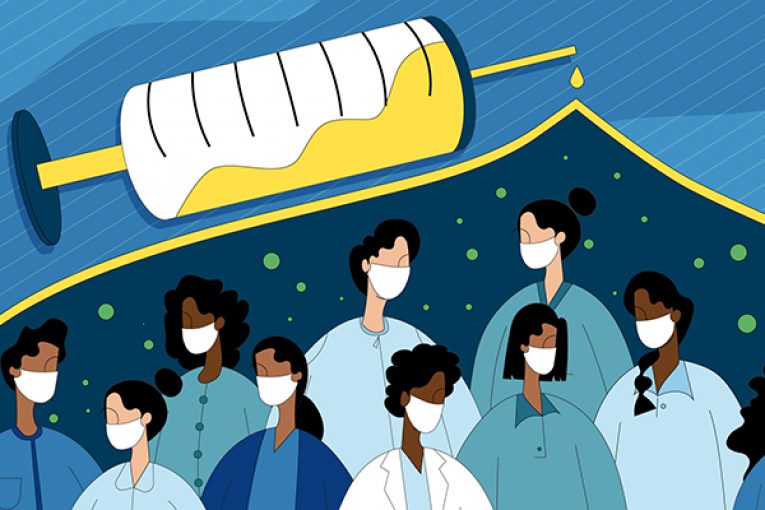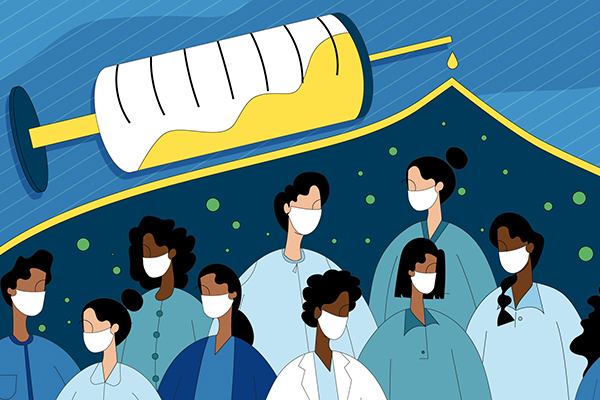

By Rachel Kim
LOS ANGELES – The Centers for Disease Control and Prevention granted UCLA’s David Geffen School of Medicine $4.9 million to study the effectiveness of the COVID-19 vaccines on healthcare workers.
Project Preventing Emerging Infections through Vaccine Effectiveness Testing (PREVENT) will enroll 10,000 healthcare workers from 16 medical centers who have experienced COVID-19 symptoms.
With three COVID-19 vaccines approved, Pfizer, Moderna, and Johnson & Johnsons have now been administered to healthcare and essential workers, and by mid-April, more than half of US states, including California, will open vaccinations up to everyone who is 16 and older.
For the study, vaccinated and unvaccinated healthcare personnel will be tested for the virus after experiencing COVID-19 symptoms. Researchers will then compare the severity of COVID-19 symptoms for those that tested positive for the virus among the two groups. This will then help researchers determine how effective the vaccines are at preventing infections and reducing symptoms for those who do test positive.

The yearlong project will conduct this observational study under the collaboration between EMERGency ID NET, a program created in response to the CDC’s plan to enhance surveillance mechanisms for emerging infectious diseases, and Project COVERED, a CDC-supported study that will evaluate and reduce the risk of acquiring COVID-19 by front-line emergency personnel in 20 academic US medical centers.
UCLA’s professor of emergency medicine and infectious diseases, Dr. David Talan, and Dr. Nicholas Mohr, University of Iowa’s professor of emergency medicine, anesthesia, and epidemiology, are the co-principal investigators who will evaluate both vaccinated and unvaccinated medical staff.
Mohr said, “Studying the experiences of health care personnel will give us insights into how we can protect both health care workers and the general public once vaccines are more widely available.”
However, UCLA Health experts are finding that masks will still be required to protect yourself from the virus as the vaccines alone will not eliminate all potential COVID-19 threats. A little while ago, UCLA Newsroom debunked widespread COVID-19 vaccine myths. They are as follows:
Myth 1: I can get COVID-19 from the vaccines
UCLA Health experts have found that you cannot get COVID-19 from the vaccine as none of the vaccines contain any live viruses that cause COVID-19. It has been stated that “[a]ll of the vaccines increase your body’s immune response by spurring it to make antibodies that block the SARS-CoV-2 virus from entering your cells. If the virus can’t enter your cells, it can’t reproduce and make you sick.”
Myth 2: I don’t need to wear a mask after getting vaccinated
Although chances of contracting the virus decrease, the vaccine will not completely eliminate all COVID-19 threats which is why everyone should continue to wear a mask, practice social distancing, and avoid crowded spaces.
Myth 3: I don’t need to get vaccinated because I’ve already had COVID-19
Everyone should get vaccinated, even if you’ve had COVID-19 before. No one is immune to the virus and the vaccine is the best possible way to increase resistance against getting it again.
It is unknown how long someone is immune to the virus after getting vaccinated or previously contracting the virus. There have been clinical studies done, yet participants have only been followed for a couple of months and results are still inconclusive. In any case, everyone should get vaccinated as soon as possible and continue to practice all COVID-19 social guidelines offered by the CDC to minimize all potential risks.
Rachel Kim is a writer for the LA Vanguard’s court watch and city news desk. Originally from Los Angeles, she currently attends UCLA as a Sociology major and hopes to bring light to injustices in our court system and show the important events that are going on throughout LA County.
To sign up for our new newsletter – Everyday Injustice – https://tinyurl.com/yyultcf9
Support our work – to become a sustaining at $5 – $10- $25 per month hit the link: